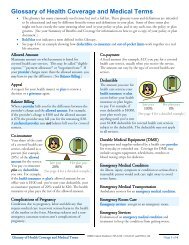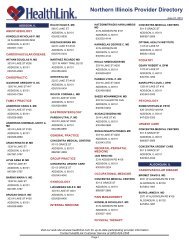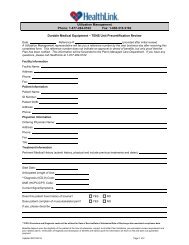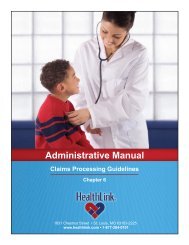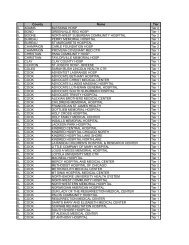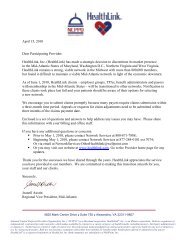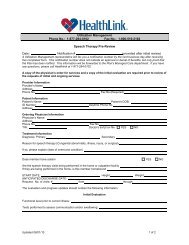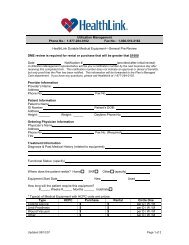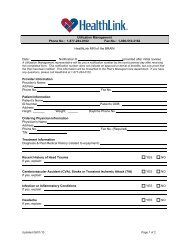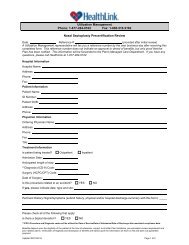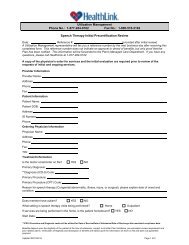State of Illinois - HealthLink
State of Illinois - HealthLink
State of Illinois - HealthLink
You also want an ePaper? Increase the reach of your titles
YUMPU automatically turns print PDFs into web optimized ePapers that Google loves.
3. Medicare Due to End-Stage Renal Disease (ESRD) – All <strong>State</strong> <strong>of</strong> <strong>Illinois</strong> Group<br />
Insurance Program plan participants who are receiving regular dialysis treatments, or<br />
who have had a kidney transplant on the basis <strong>of</strong> ESRD, are required to apply for<br />
Medicare benefits.<br />
Plan participants must contact the <strong>State</strong> <strong>of</strong> <strong>Illinois</strong> Medicare Coordination <strong>of</strong> Benefits<br />
(COB) Unit at 800-442-1300.The <strong>State</strong> <strong>of</strong> <strong>Illinois</strong> Medicare COB Unit calculates the<br />
30-month coordination period in order for plan participants to sign up for Medicare<br />
benefits on time to avoid additional out-<strong>of</strong>-pocket expenditures.<br />
Medicare Part A – plan participants who become eligible for Medicare benefits on the<br />
basis <strong>of</strong> ESRD are required to accept the Medicare Part A coverage and submit a copy<br />
<strong>of</strong> the Medicare identification card to the Medicare COB Unit upon receipt.<br />
Medicare Part B – the <strong>State</strong> <strong>of</strong> <strong>Illinois</strong> Group Insurance Program allows actively<br />
working plan participants who are eligible for Medicare on the basis <strong>of</strong> ESRD to delay<br />
enrollment in Medicare Part B until the end <strong>of</strong> the ESRD coordination period. Medicare<br />
Part B is required at the end <strong>of</strong> the ESRD coordination period.<br />
Coordination <strong>of</strong> Benefits – The insurance plan that is determined to be the primary<br />
payor at the start <strong>of</strong> the coordination period remains the primary payor for 30 months<br />
(as long as Medicare and the <strong>State</strong> plan both remain in effect).<br />
Medicare Part B Reduction – Plan participants who become eligible for Medicare<br />
benefits on the basis <strong>of</strong> ESRD are required to accept the Medicare Part B coverage<br />
when Medicare is determined to be the primary payor.<br />
Failure to enroll or remain enrolled in Medicare Part B, when Medicare is determined<br />
to be the primary payor, results in a reduction <strong>of</strong> eligible benefit payments under the<br />
<strong>State</strong> plan. This means that the <strong>State</strong> plan will only pay up to 20% <strong>of</strong> the total innetwork<br />
eligible amount for services rendered by in-network providers. For services<br />
rendered by out-<strong>of</strong>-network providers, the claim payment will be no more than 20% <strong>of</strong><br />
the total eligible billed amount. The reduction <strong>of</strong> benefits provision will apply until<br />
Medicare Part B is in effect. The plan participant is responsible to pay the remaining<br />
claim balance. The <strong>State</strong> plan has the right to recover any overpaid claim amounts.<br />
4. Services and Supplies Not Covered by Medicare – Services and supplies that are not<br />
covered by Medicare will be paid in the same manner (i.e., same benefit levels and<br />
deductibles) as if the plan participation did not have Medicare (provided the services<br />
and supplies meet medical necessity and benefit criteria and would normally be eligible<br />
under the plan coverage).<br />
5. Private Contracts with Providers who Opt out <strong>of</strong> Medicare – Some health care<br />
providers choose to opt out <strong>of</strong> the Medicare program. When a plan participant (who has<br />
Medicare as their primary payor) has medical services rendered by a provider who has<br />
opted out <strong>of</strong> the Medicare program, a private contract is usually signed explaining that<br />
the plan participant is responsible for the cost <strong>of</strong> the medical services rendered. Neither<br />
provider nor plan participant is allowed to bill Medicare. Therefore, Medicare will not<br />
160000 Page 30



